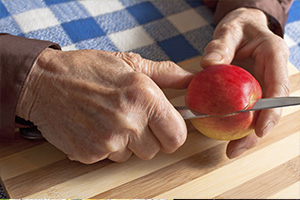 Malnutrition is a common problem for people on dialysis. Not eating properly can delay wound healing, cause fatigue and increase chances of developing an infection.* According to the National Kidney Foundation and the Academy of Nutrition and Dietetics, there are certain nutrients and foods you should focus on consuming while on dialysis.** Remember to speak with your healthcare provider about helping you plan a diet specific to your individual needs.
Malnutrition is a common problem for people on dialysis. Not eating properly can delay wound healing, cause fatigue and increase chances of developing an infection.* According to the National Kidney Foundation and the Academy of Nutrition and Dietetics, there are certain nutrients and foods you should focus on consuming while on dialysis.** Remember to speak with your healthcare provider about helping you plan a diet specific to your individual needs.
What should you limit or avoid?
Sodium, potassium and phosphorus levels in your body need to be managed when on dialysis. Limiting the amount of salt in your diet will help you maintain proper blood pressure, manage thirst levels and proper hydration, and ensures that your body doesn’t retain too much fluid.
Typically, kidneys remove the extra fluid in your body, but when kidneys aren’t working properly, it’s important to watch the amount of fluids you consume. If you retain too much fluid, you may notice swelling in your ankles or feet or shortness of breath.
Avoid these foods, which may be high in sodium, potassium or phosphorus:
|
High-Sodium Foods |
High-Potassium Foods |
High-Phosphorus Foods |
|
Deli meat |
Bananas |
Cheese |
|
Canned tuna |
Oranges or orange juice |
Ice cream |
|
Pretzels or chips |
Greens |
Milk |
|
Microwave meals |
Avocados |
Yogurt |
|
Soy sauce or hot sauce |
Potatoes |
Nuts and peanut butter |
|
Canned soup |
Tomatoes |
Bran cereals |
What should you focus on?
Meat and Other Sources of Protein
You lose protein in your body as your blood is filtered in dialysis, so it’s important to eat more protein to maintain blood protein levels. Foods that are high in protein include fresh meat, chicken, fish, pork and eggs. Remember to limit the amount of processed protein sources you consume because they may contain added sodium or phosphorus.
Grains and Other Sources of Carbohydrate
Grains are good to include in your diet and may be eaten freely, unless you need to watch your weight or blood sugar levels. Good sources of grains include white rice, cream of wheat, corn flakes, unsalted crackers, white or rye bread and cooked pasta. Remember to limit foods labeled as “whole grain” or “high fiber,” as these may contain high amounts of phosphorus. Because “whole grain” foods often contain beneficial fiber, fiber is a nutrient that may be lacking in some individuals on dialysis.
Dairy Products
Most dairy products are high in phosphorus, so stick to dairy foods with lower phosphorous levels such as butter or margarine, cream cheese, brie cheese or ricotta cheese.
Fruits and Vegetables
Fruits and vegetables contain fiber, which is good for gut health and regularity, but they are sometimes high in potassium. To avoid high potassium levels, eat apples, berries, grapes, peaches, watermelon, cranberry juice cocktail, broccoli, cabbage, green beans, peppers, cucumber, celery, carrots and zucchini.
To stay healthy, pay close attention to the foods you eat while on dialysis. Since many high-protein products contain added sodium, fruits and vegetables contain high amounts of potassium, and whole grain products contain high amounts of phosphorus, consider adding Pro-Stat Renal Care to your daily meal routine. Pro-Stat Renal Care contains 15 grams of protein and 3 grams of soluble fiber per 1 fl oz serving!
To learn more about Pro-Stat® Renal Care SHOP NOW
*Sen D, et al. J Assoc Physicians India. 2000; 48(7):724-30.
**http://www.kidney.org/atoz/content/dietary_hemodialysis
